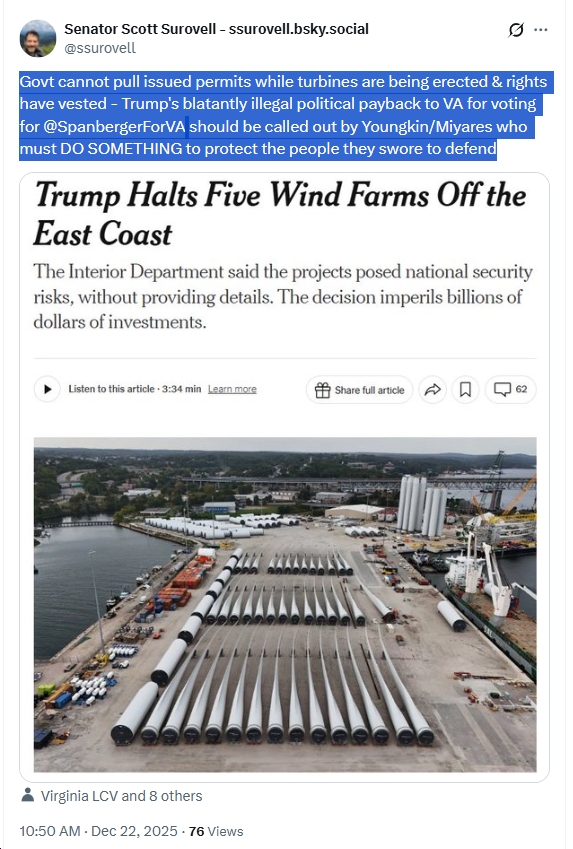 An earthquake shook Richmond, Virginia on the afternoon of Monday, February 12, rocking the House of Delegates just as it was supposed to be passing HB 1558, Dominion Energy’s Ratepayer Rip-Off Act of 2018. The bill was intended to help the utility lock in stupendous unearned profits for its parent company, courtesy of the monopoly’s captive customers, under the guise of supporting clean energy and grid investments.
An earthquake shook Richmond, Virginia on the afternoon of Monday, February 12, rocking the House of Delegates just as it was supposed to be passing HB 1558, Dominion Energy’s Ratepayer Rip-Off Act of 2018. The bill was intended to help the utility lock in stupendous unearned profits for its parent company, courtesy of the monopoly’s captive customers, under the guise of supporting clean energy and grid investments.
And the bill did pass the House, but only after delegates adopted an amendment offered by Minority Leader David Toscano stripping away a lucrative provision that Dominion both desperately wanted and swore didn’t exist: the infamous “double dip” that the SCC has said would allow Dominion to charge customers more than twice over for a large portfolio of infrastructure projects. With billions of dollars worth of projects on the drawing board, the double dip meant serious money.
Anyone who didn’t believe the double dip was real only needed to listen to Dominion lobbyist Jack Rust respond to repeated questions about it during a Senate Commerce and Labor Committee hearing two weeks earlier. It was a “yes or no” question that Rust wouldn’t answer with a yes or a no.
Obfuscation, however, was good enough for the Senate, which passed SB 966 last week by a bi-partisan vote of 26-13. It was good enough for Governor Northam, too, who had already pledged to sign the bill. A few environmental groups broke ranks to support the bill, too, cheering the provisions for energy efficiency and the promise of more renewables.
Admittedly, the Attorney General’s Office of Consumer Counsel remained opposed. So did other environmental and consumer groups, complaining not just about the double dip, but about ceding control over the future of Virginia’s electric grid to a profit-driven monopoly. But when has the General Assembly ever cared what environmental and consumer groups thought? So passing the bill through the House should have been easy.
And then Toscano called Dominion’s bluff. If the double dip is real, said Toscano, his amendment would fix it. If the bill doesn’t already allow for double-dipping, then making doubly sure of that does no harm.
The logic was unassailable, though bill patron and Friend of Dominion Terry Kilgore assailed it anyway. As the Associated Press reported, Kilgore tried to persuade legislators to reject Toscano’s amendment. Yet even some fellow Republicans deserted him on the vote, helping Democrats pass it 55-41. A quick-thinking Delegate Habeeb, apparently recognizing bad optics for the Republicans, called for a second vote, and this time the amendment passed 96-1, with even Kilgore supporting it.
By all accounts, the vote was unprecedented. Dominion does not lose floor votes. The vote rocked the House.
In hindsight, perhaps Dominion should have known a fault line had formed. Grassroots groups were agitating against the power of monopoly. A new group called Clean Virginia was agitating against the bill. Almost all the freshmen Democrats had pledged not to accept Dominion money—and there were a lot of them, thanks to last fall’s “blue wave” election. But the Republicans had already scuttled most of their bills; surely they had learned humility? They had not. They all supported Toscano’s amendment, and all but one followed him in opposing final passage of the bill, which passed 63-35.
The earthquake could be felt over at Dominion headquarters, where reporters could be seen inspecting the foundation for damage. CEO Tom Farrell called in his damage control specialists, heavy-hitting lobbyists Eva Teig Hardy and Bill Thomas, to persuade legislators to support the Senate version of the bill over the House version—or failing that, to lard it up with new favors to the utilities.
According to the AP, Kilgore continued to maintain after the vote that the double dip was “more perception than reality.” But he also said, “Toscano’s amendment takes ‘a lot of stuff out that needs to stay in’ the legislation. ‘I’m going to have to fix it.’”
One might think Dominion and its allies would be embarrassed to defend a provision they say doesn’t exist. Reportedly they have pivoted to a different argument, that the company would have no incentive to invest in renewable energy if it isn’t allowed to rip off ratepayers in the process. Accordingly, they are holding solar investments hostage, knowing how much Democrats want them.
Dominion’s new argument is simply posturing. Its 2017 Integrated Resource Plan declared solar to be the cheapest form of energy in Virginia, and it had signaled via the Rubin Group its plan to build at least 3,000 MW of solar in the coming years. Saying now that it might take its ball and go home is a sign its lobbyists are out of good arguments.
In the past, good arguments were not a requirement for Dominion to get what it wants; political power has always been enough. It will be interesting to see now whether Dominion emerges with some semblance of its omnipotence intact, or whether this earthquake presages new shocks that could crack the fortress.

















